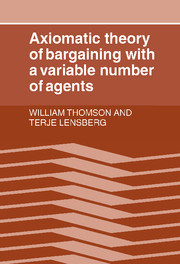Book contents
- Frontmatter
- Contents
- Acknowledgments
- List of symbols and notation
- List of axioms
- 1 Preliminaries
- 2 Axiomatic theory of bargaining with a fixed number of agents
- 3 Population Monotonicity and the Kalai–Smorodinsky solution
- 4 Population Monotonicity and the Egalitarian solution
- 5 Truncated Egalitarian and Monotone Path solutions
- 6 Guarantees and opportunities
- 7 Stability and the Nash solution
- 8 Stability without Pareto-Optimality
- 9 Stability and the Leximin solution
- 10 Population Monotonicity, Weak Stability, and the Egalitarian solution
- 11 Stability and Collectively Rational solutions
- 12 Invariance under Replication and Juxtaposition
- Bibliography
- Index
5 - Truncated Egalitarian and Monotone Path solutions
Published online by Cambridge University Press: 23 March 2010
- Frontmatter
- Contents
- Acknowledgments
- List of symbols and notation
- List of axioms
- 1 Preliminaries
- 2 Axiomatic theory of bargaining with a fixed number of agents
- 3 Population Monotonicity and the Kalai–Smorodinsky solution
- 4 Population Monotonicity and the Egalitarian solution
- 5 Truncated Egalitarian and Monotone Path solutions
- 6 Guarantees and opportunities
- 7 Stability and the Nash solution
- 8 Stability without Pareto-Optimality
- 9 Stability and the Leximin solution
- 10 Population Monotonicity, Weak Stability, and the Egalitarian solution
- 11 Stability and Collectively Rational solutions
- 12 Invariance under Replication and Juxtaposition
- Bibliography
- Index
Summary
Introduction
In the preceding chapter we proved that the Egalitarian solution is the only solution to jointly satisfy Weak Pareto-Optimality, Symmetry, Independence of Irrelevant Alternatives, Population Monotonicity, and Continuity. The purpose of the present chapter is to pursue this characterization further by determining what additional solutions would be made admissible by removing from this list of axioms Weak Pareto-Optimality on the one hand and Symmetry on the other.
Each of the two previous chapters concluded with the sort of “sensitivity analysis” that consists in successively dropping each of the axioms from a list previously shown to characterize a solution. The following chapters will contain similar exercises whenever relevant. In most cases it will be possible to give a complete description of all solutions satisfying the shorter list of axioms, and in the process important insights into the power and the significance of each of the axioms will be gained. Sometimes, interesting new families of solutions will be encountered, and these cases will be treated at greater length. This is the situation when either Weak Pareto-Optimality or Symmetry are deleted from the list of Chapter 4 characterizing the Egalitarian solution.
Apart from the technical interest of the sensitivity analysis discussed here, there are important conceptual reasons for it. Once a solution has been characterized, it is indeed natural to investigate how much freedom would be gained by sacrificing each of the axioms involved in the characterization and to find out what alternative axioms are compatible with the remaining ones.
Information
- Type
- Chapter
- Information
- Publisher: Cambridge University PressPrint publication year: 1989
